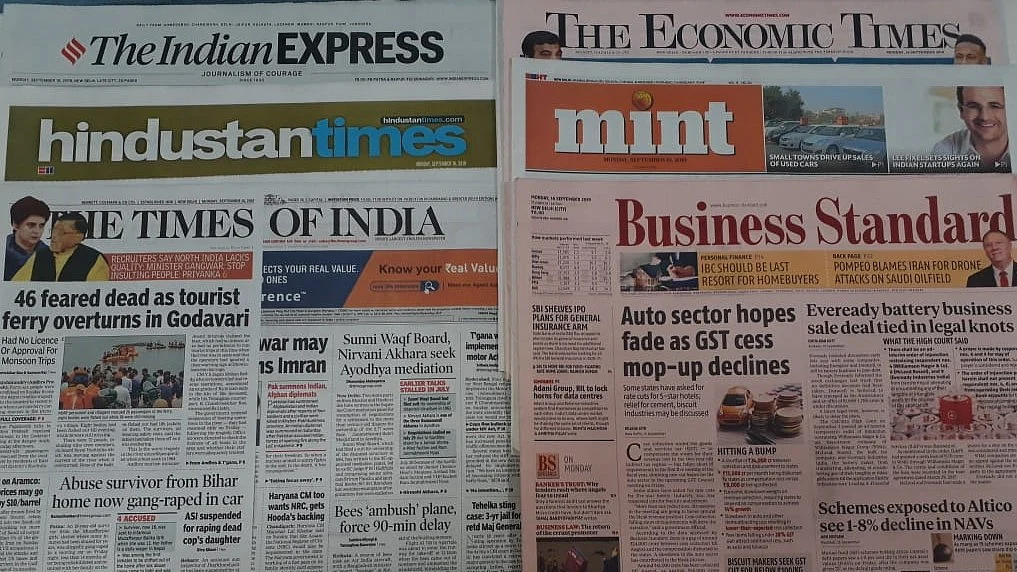Supreme Court disappoints, say editorial comments while pulling up the Govt on Kashmir lockdown
Editorials on Saturday in most Indian newspapers, while welcoming the principles laid down by SC, voiced disappointment at the court stopping short of declaring the lockdown unconstitutional

While welcoming the principles laid down by the Supreme Court on Friday on restrictions on freedom imposed by the state in J & K, in editorial comments, virtually all English newspapers in India expressed both surprise and disappointment at the court’s failure to strike down the restrictions as unconstitutional.
Pointing out that for liberal democracy, suspending internet access in a region it considers to be an integral part is not ‘ great advertisement’ for either liberal democracy or governance, most of the comments lamented at the Supreme Court falling short of remedying a wrong.
However, the broad principles laid down by the court were welcomed. The court not only ruled that Internet access was a fundamental right but also declared that the right to information also included the right to know why restrictions are imposed. It laid down that all orders imposing restrictions must spell out the immediate provocation, and not apprehension, and that such restrictions needed to be reviewed every week. Restrictions, it underlined, could not be indefinite or disproportionate.
Here are excerpts from some of the editorial comments on Saturday:
The Hindu
SC fails to decide on the validity of J&K curbs
If enunciating the law and laying down norms for the exercise of executive power were the only functions of a constitutional court, the Supreme Court’s verdict on the prolonged lockdown in Jammu and Kashmir (J&K) is indeed admirable.
The court does not go beyond directing the authorities to review all their orders and restrictions forthwith.
The government is bound to publish all orders it passes regarding such restrictions so that they can be challenged in a court of law. It is here that the verdict acquires another unusual character. Having rejected the government’s stand that it could not produce all the orders on the restrictions imposed since August 4, 2019, the court fails to strike them down on that ground. After all, it concurrently says every order imposing a restriction should state the reason, the exigency that necessitated it and the features that make it clear that it is the least intrusive measure. The absence of such an order in the public domain is evidence that the state failed to demonstrate its necessity.
Hindustan Times
No immediate relief
The apex court has taken over five months to layout these principles. Civil liberties must be of the highest priority, and this reflects a certain degree of abdication of responsibility…SC’s judgment also does not provide immediate relief. It leaves the door open for the executive to argue that these orders are justified on security grounds, and perhaps prolonged legal process for the full resumption of rights.
The Economic Times
Welcome clarity, but…
If the aim of the withdrawal of Article 370 in Jammu & Kashmir, welcomed by this paper, was to ‘mainstream’ the state, not only has the Internet shutdown since August 4, 2019, belied the goal, but also let such sledgehammer methods to be considered ‘normal’…In October last year, Union minister Jitendra Singh even went to the extent to say that those opposing the indefinite curb on the Internet in Kashmir either “ have a vested interest in the continuance of militancy in Jammu & Kashmir or want to ‘play politics at the cost of India’s sovereignty and the common man’s safety”. Should these motives apply to the Supreme Court as well?
The Indian Express
Both surprising and disappointing
While the petitions were specifically about J & K, the questions raised in them have acquired country-wide resonance after protests against the CAA and the proposed NRC. By stating that any order for suspension of the internet can be judicially reviewed, but effectively providing no remedy when such a review came up before it, the court has only left the door open for more litigation. It has pushed back against the state, it needs to do more to secure the people’s right in J&K it has so powerfully underlined.
The Times of India
Ease of doing business
Ease of doing business requires predictability from government, which has been sorely missing in recent times…SC has also advised the government to construe so-called ‘emergency’ situations with a sense of balance, and in proportion to the seriousness of the event while adopting the least ‘ restrictive measures’. The costs of the 150-odd-day shutdown clearly outweigh the benefits. Internet and free movement in Kashmir must be restored.
Compiled by Aishwarya Singh
Follow us on: Facebook, Twitter, Google News, Instagram
Join our official telegram channel (@nationalherald) and stay updated with the latest headlines
Published: 11 Jan 2020, 3:19 PM